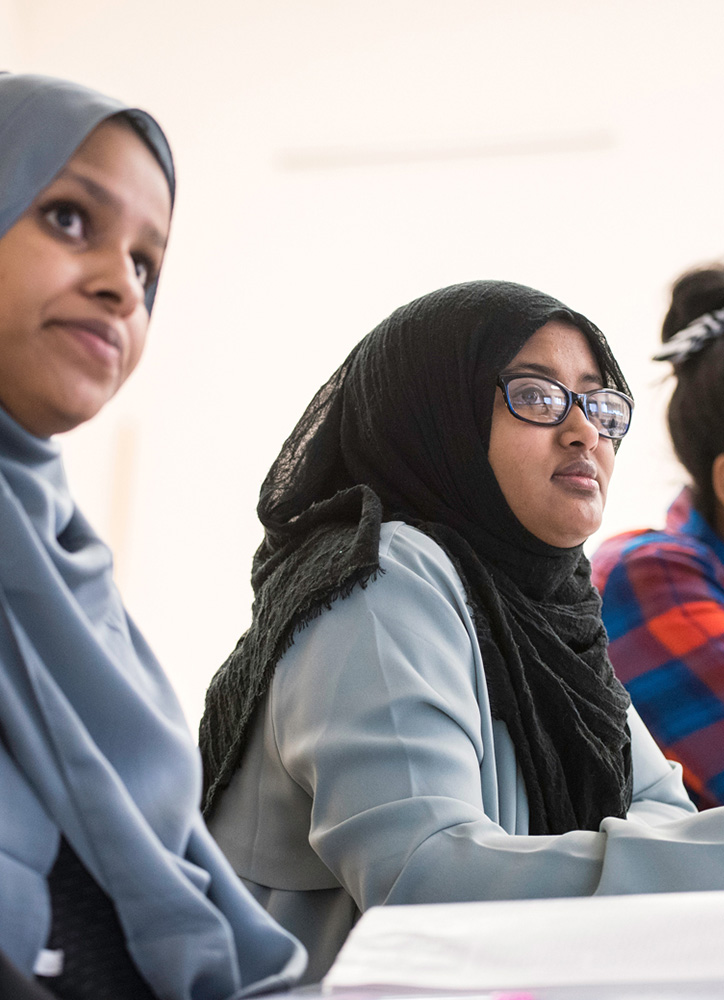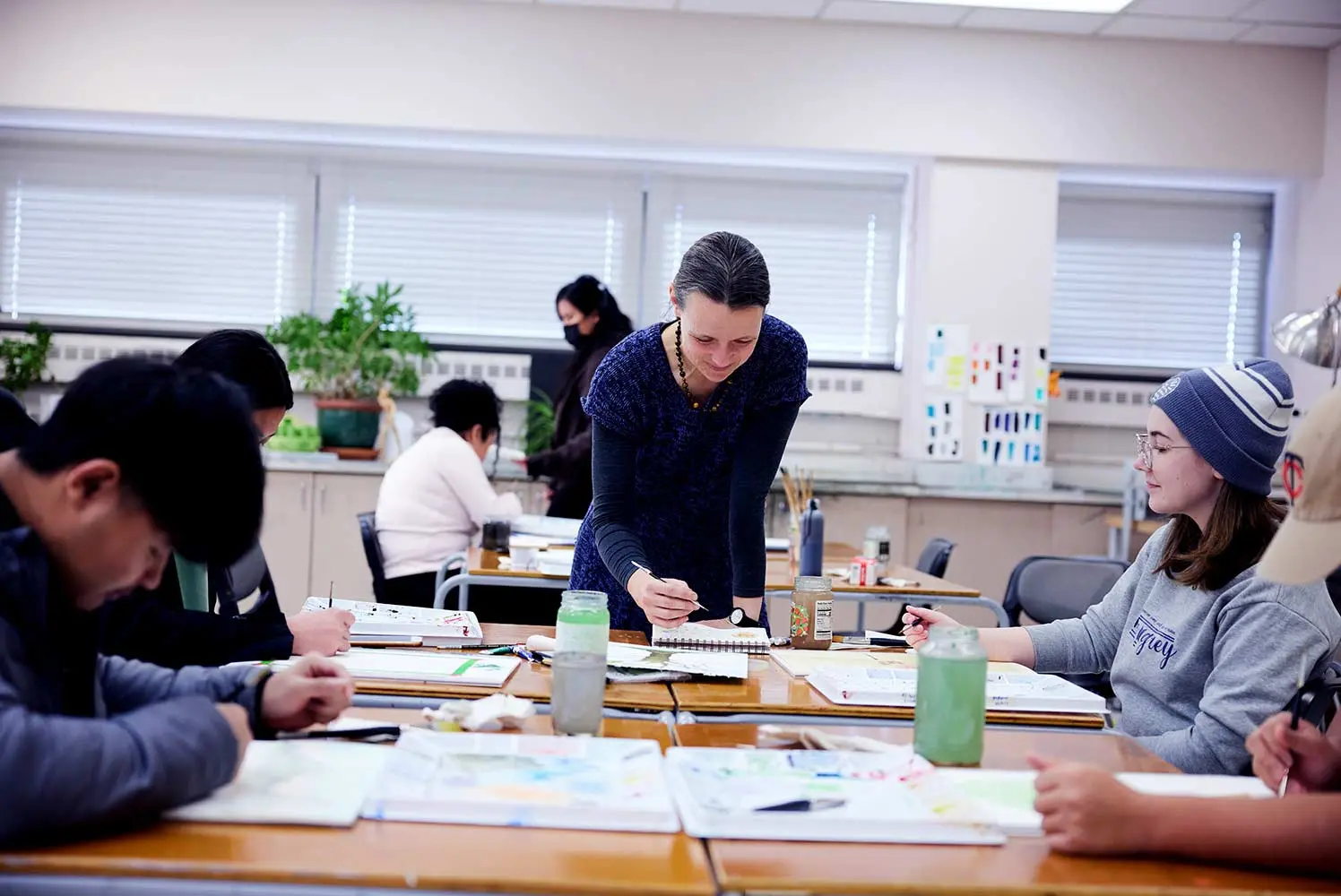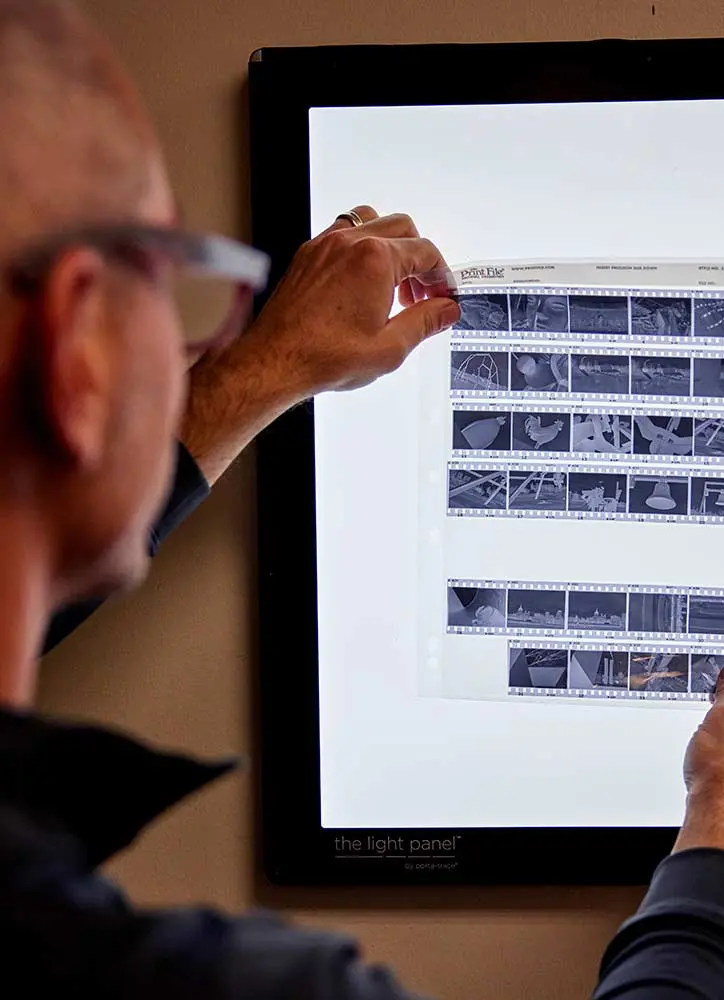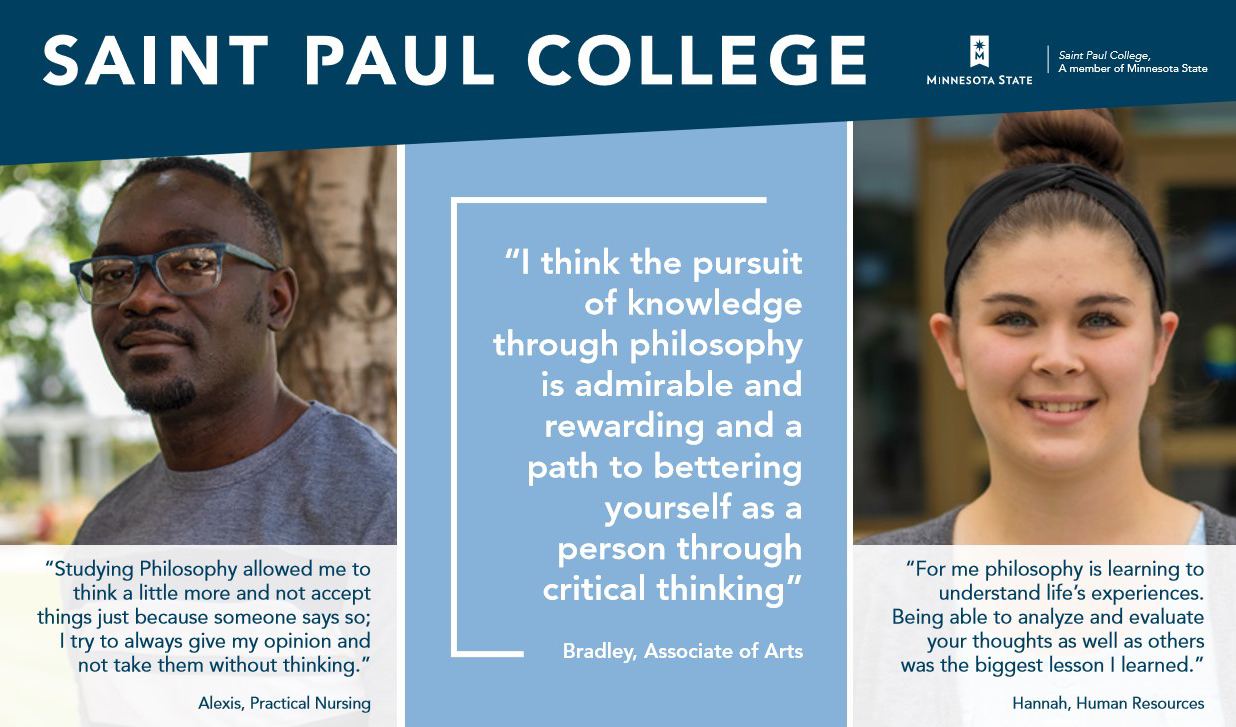Liberal Arts and Fine Arts Courses
Program Overview
Taking courses in the liberal arts and fine arts division is an excellent choice because you can explore your creativity and learn about different cultures and ideas. Our courses help you think critically and express yourself in new ways. If you want to continue your education at a four-year college, many of our courses can be transferred, saving you time and money while following your passion.

Course Options
Courses can be completed through various course delivery methods, including face-to-face, hybrid, or online. Course delivery methods change on a semester basis. Please check the current Course Schedule for the most up-to-date information.
Many of these courses fulfill Minnesota Transfer Curriculum (MnTC) requirements and graduation requirements for program majors. Review the catalog for course requirements.

- American Sign Language (ASL) Courses
- Anthropology Courses
- Arabic Courses
- Art Courses
- Chinese Courses
- Communication Courses
- Drama and Theatre Courses
- Economics Courses
- English Courses
- Geography Courses
- History Courses
- Humanities Courses
- Music Courses
- Philosophy Courses
- Political Science Courses
- Psychology Courses
- Reading Courses
- Sociology Courses
- Spanish Courses
- Women’s and Gender Studies Courses
American Sign Language Courses
Overview
American Sign Language (ASL) is a bona-fide language. It has grammar, structure and linguistics rules that govern it as do all other languages. Signed English is not the same as American Sign Language.
Not all ASL courses meet the MnTC goals. Students may reference the American Sign Language course descriptions to see if a course meets Minnesota Transfer Curriculum goals.
The American Sign Language courses taught at Saint Paul College are central to the 30-credit American Sign Language Studies Certificate program, which provides students with the knowledge and skills of American Sign Language (ASL), focusing on the uniqueness of ASL as a language, Deaf Culture and Deaf History.
Not all ASL courses meet the MnTC goals. Students may reference the American Sign Language course descriptions to see if a course meets Minnesota Transfer Curriculum goals.
The American Sign Language courses taught at Saint Paul College are central to the 30-credit American Sign Language Studies Certificate program, which provides students with the knowledge and skills of American Sign Language (ASL), focusing on the uniqueness of ASL as a language, Deaf Culture and Deaf History.
Courses and Descriptions
American Sign Language Courses
Credit by Exam/Test-Out Information
Anthropology Courses
Overview
The Anthropology department offers courses that cover human nature and society in a global context. Students are exposed to the biological and cultural evolution of our species and the cultural worlds past, present and future. Forces which have shaped us, and which we continuously shape, are discussed within local, national and global perspectives.
Students are encouraged to critically assess, as well as celebrate, the cultural diversity of our world.
Anthropology courses fulfill Minnesota Transfer Curriculum (MnTC) requirements and graduation requirements.
For more information on the Associate of Arts degree and the Minnesota Transfer Curriculum:
Courses and Descriptions
View all Anthropology Courses and Descriptions
Arabic Courses
Overview
Arabic language courses are designed to develop a basic competency in Arabic speaking, listening, reading, and writing; an appreciation for cultural diversity; and the application of conversational Arabic to work and life roles. Students who enroll in Arabic courses fulfill the Minnesota Transfer Curriculum requirements as well as graduation requirements.
Courses and Descriptions
View all Arabic Courses and Descriptions
Art Courses



Overview
Art courses are designed to provide the highest quality coursework for students majoring in art, as well as students who are interested in exploring their creative expression through the creation of artwork in a studio class or the study of art in a historical context. Our art coursework provides students with a richer understanding of the world and themselves.
Art and art history classes also fulfill requirements for the Minnesota Transfer Curriculum (MnTC), as well as graduation requirements.
Transfer Options
The fine arts and humanities department offers a large variety of studio and art history coursework that transfers towards a major in Art or Art History at a four-year institution. Students who plan on majoring in art at a four-year institution should include art history, studio art and humanities coursework in order to be prepared for upper division work in whatever area of art they may choose for their area of concentration.
Courses and Descriptions
View all Art Courses and Descriptions
Each semester, the Advanced Photography class at Saint Paul College participates in a service learning project. Each project is an opportunity for photographic artists to partner with community-oriented organizations. As photographers, the students document and artistically interpret these organizations through their photographs and portray them in a way that might appear unique and/or different from the ordinary.
Past projects include:
- The Wilder Center
- The Minnesota State Capitol
- The Union Depot
- Rice Park
- Saint Paul Cathedral
- Como Park
- Raspberry Island
- Phalen Park
Chinese Courses
Overview
Chinese courses are designed to develop a basic competency in Chinese speaking, listening, reading, and writing; an appreciation for cultural diversity; and the application of conversational Chinese to work and life roles.
Students with two years of high school Chinese are generally prepared for beginning courses, while students with three to four years of high school Chinese are generally ready to enter intermediate courses. See Chinese Courses and Descriptions for information on enrolling for specific course levels.
Students who enroll in Chinese courses fulfill the Minnesota Transfer Curriculum requirements as well as graduation requirements.
Courses and Descriptions
Communication Courses
Overview
Rhetoric is where the study of communication began. By definition, rhetoric refers to oratory or persuasive speaking. The Communication faculty promotes the study and application of human communication and mass communication concepts and skills for work and life roles.
Drama and Theatre courses are also available at Saint Paul College.
Students enroll in Communication courses to fulfill Minnesota Transfer Curriculum (MnTC) requirements and graduation requirements.
For more information on the Associate of Arts degree and the Minnesota Transfer Curriculum:
Courses and Descriptions
View all Communication Courses and Descriptions
Drama and Theatre Courses
Overview
The Drama and Theatre Department course offerings cover both the theoretical and performance aspects of theatre.
Students who enroll in Theatre and Drama courses fulfill the Minnesota Transfer Curriculum requirements as well as graduation requirements. Communications courses are also available at Saint Paul College.
For more information on the Associate of Arts degree and the Minnesota Transfer Curriculum:
Associate of Arts Degree Program Requirements
Minnesota Transfer Curriculum Goals
Spring Plays
Each spring semester, the Saint Paul College Drama and Theatre Department presents a play production, with performances in the College Theatre. Admission is free and open to the public.
Courses and Descriptions
Economics Courses
Overview
Economics is a social science that studies how our society can achieve economic goals. These goals are divided into two main areas of macroeconomics and microeconomics. Goals in macroeconomics are full employment, price stability, and economic growth. Macroeconomics uses theoretical tools, historical perspective, and modeling to understand the development and functioning of macroeconomic policy.
Macroeconomics explores how policy advocated by economist and political advisors is implemented and with what degrees of success. Microeconomic goals are maximizing individual and societies benefits using limited resources. Microeconomics uses modeling to understand how and why our resource markets work and provides insights into policies that make them more efficient.
For more information on the Associate of Arts degree and the Minnesota Transfer Curriculum:
Courses and Descriptions
View all Economics Courses and Descriptions
English Courses
Overview
The English and Communications faculty are dedicated to helping students apply the knowledge and skills gained through the study of writing and literature to successfully communicate in work and life roles.
Two levels of developmental writing courses are available. The department offers a wide selection of transferable general education courses including Composition 1 and 2 and literature courses including the Survey of American Literature, The English Novel, Native American and African American Literature, an Introduction to Poetry and others.
Students planning to transfer to a four-year degree generally enroll in Composition courses and one or two related electives as they fulfill requirements for the Associate in Arts, Associate in Science and Associate in Applied Science degrees.
For more information on the Associate in Arts degree and the Minnesota Transfer Curriculum:
Courses and Descriptions
View all English Courses and Descriptions
Geography Courses
Overview
Geography studies places and human activities across the earth. Geographers often ask “where?” and “why?” The field focuses on the distribution and changes in the location of ethnicities, resources, transportation, land use, industries, climate, physical land formations, etc. Many geography courses have both physical environment and human/cultural components. The geography faculty often have a global and interdisciplinary approach.
Currently the department offers courses in Physical Geography, Human Cultural Geography, Global Economic Geography, Minnesota Geography and World Geography.
The College offers Geography courses to fulfill Minnesota Transfer Curriculum (MnTC) requirements and graduation requirements.
For more information on the Associate of Arts degree and the Minnesota Transfer Curriculum:
Courses and Descriptions
View all Geography Courses and Descriptions
History Courses
Overview
The History Department promotes the study, teaching and analysis of historical developments which have created our present world. The historical past is studied so that students can better fulfill their work and life roles.
The department offers basic survey courses in American history and the history of world civilizations, although students are not required to take these courses in chronological order. In addition to survey courses, a course in Minnesota history is offered emphasizing the social, political, cultural and economic history of the state as well as a course on immigration and the ethnic history of the United States. The department also offers a course on the history of women in the United States and recently introduced a Special Topics in History course.
Also offered is the Associate of Arts Degree – Emphasis in History which prepares students for transfer to a baccalaureate program in History.
For more information on the Associate of Arts degree and the Minnesota Transfer Curriculum:
Courses and Descriptions
View all History Courses and Descriptions
Humanities Courses
Overview
Humanities courses promote the study of cultural developments. Students gain an increased understanding of the world they live in, how it came to be as it is, and what their place is in it. Students will be asked to consider how they can apply what they have learned about what has come before to what might occur in the future.
Humanities is an interdisciplinary subject in that it is an exploration of the influence particular fields have on each other; for example, the influence of political movements on visual art, or the influence of religion on poetry of the same period. The fields included in the Humanities are: art, history, literature, philosophy, religion, politics, law, music, drama and language. Students are encouraged to make comparisons between different fields and different time periods and to consider the significance of similarities and differences.
Humanities courses fulfill Minnesota Transfer Curriculum (MnTC) requirements and College degree program requirements.
For more information on the Associate of Arts degree and the Minnesota Transfer Curriculum:
Courses and Descriptions
View all Humanities Courses and Descriptions
Music Courses
Overview
The College offers Music courses to fulfill the Minnesota Transfer Curriculum (MnTC) requirements and graduation requirements.
Also offered is the Associate of Fine Arts Degree in Music which provides students with the educational foundation needed to transfer to a four-year music program
For more information on the Associate of Arts degree and the Minnesota Transfer Curriculum:
Courses and Descriptions
View all Music Courses and Descriptions
Philosophy Courses
Overview
Philosophy is the search for well-reasoned answers to fundamental questions, such as: What’s right or wrong? What laws and policies should we have? What makes a society just and fair, or oppressive and unjust? What can we know and how can we know it? Doing philosophy enables us to grapple effectively with questions about ourselves and our world.
Studying philosophy teaches you valuable and empowering thinking, reasoning, problem-solving, and communication skills that are useful for …
Seeking Truth and Justice and Thinking for Yourself:
“I took ‘Introduction to Philosophy’ … After that course, I was hooked. I loved the clarity and logic and especially the intellectual discipline – in short, the habits and elegance of thought that was philosophy.”
Kwame Ture, Civil Rights Leader, B.A. in Philosophy
source: The Life and Struggles of Stokely Carmichael (Kwame Ture), Scribner 2003
Business and Entrepreneurship
[P]hilosophy is a study of how to think clearly … Formulating what your investment thesis is, what the strategy is, what the risks with the approach are, what kinds of things you would be doing with it, are all greatly aided by the crispness of thinking that comes with philosophical training.
Reid Hoffman, founder of LinkedIn, MA in Philosophy
source: www.businessinsider.com
Science and Engineering
The main skills you learn in a humanities degree are timeless: critical
reading, critical thinking, communication of complex ideas, and most importantly (in my opinion) logical reasoning. These skills have made me a far better engineer than I would have been without them, and I expect the same is true for most others with an arts degree, no matter which field they enter.
Rosemary Barnes, Engineer; Engineering and Philosophy degree
source:www.abc.net.au/news
Blazing Your Own Career Path
It was by far the best major I could have taken in college. It
allowed me to do anything that I wanted to do. Philosophy is a
great major because it allows me to ask questions, and that is
what I do every day.
Katy Tur, journalist, B.A. in Philosophy
source: Saber, Ian, “Katy Tur on Her Philosophy
Degree,” NBC News, June 6, 2017
Learn More about our Philosophy Courses (pdf).

For more information on the Associate of Arts degree and the Minnesota Transfer Curriculum:
Courses and Descriptions
View all Philosophy Courses and Descriptions
Political Science
Overview
The Political Science faculty prepare students for involved citizenship and an understanding of the fundamentals of political systems.
Students enroll in political science courses to fulfill Minnesota Transfer Curriculum (MnTC) requirements and graduation requirements.
For more information on the Associate of Arts degree and the Minnesota Transfer Curriculum:
Courses and Descriptions
View all Political Science Courses and Descriptions
Psychology Courses
Overview
Psychology is the scientific inquiry into human behavior and mental processes explaining the complexity of issues from both an environmental and biological perspective. Courses are offered that provide a foundation in core psychological areas. Students enroll in psychology to get a better understanding of human behavior in a variety of settings as well as for relevant preparation for nursing, business and other fields.
Psychology courses fulfill the Minnesota Transfer Curriculum (MnTC) requirements and graduation requirements.
For more information on the Associate of Arts degree and the Minnesota Transfer Curriculum:
Courses and Descriptions
View all Psychology Courses and Descriptions
Reading Courses
Overview
The Reading faculty are dedicated to helping students become proficient and successful readers so they may apply this knowledge to meet the demands of their content-area and program specific reading assignments and their future careers.
College reading involves a variety of skills and strategies used together to gain meaning from academic or technical text; it requires critical thinking, draws on background knowledge of a variety of topics, and makes use of a large vocabulary.
Courses and Descriptions
Sociology Courses
Overview
Sociology courses are designed to emphasize the importance of the sociological perspective in work and life roles in a global world.
Many students take sociology courses to develop personal skills and to learn about other cultures and societies. The Sociology faculty strive to promote social awareness, active citizenry and critical thinking within and beyond our own culture.
Students enroll in Sociology courses to fulfill Minnesota Transfer Curriculum (MnTC) requirements and graduation requirements.
For more information on the Associate of Arts degree and the Minnesota Transfer Curriculum:
Courses and Descriptions
View all Sociology Courses and Descriptions
Spanish Courses
Overview
Spanish courses are designed to develop proficiency in Spanish speaking, listening, reading, and writing; an appreciation for cultural diversity; and the application of conversational Spanish to work and life roles.
Beginning and Intermediate level courses are offered. Students with two years of high school Spanish are generally prepared for beginning courses. Students with three to four years of high school Spanish are generally ready to enter intermediate courses.
Students who enroll in Spanish courses fulfill the Minnesota Transfer Curriculum (MnTC) requirements as well as graduation requirements.
For more information on the Associate of Arts degree and the Minnesota Transfer Curriculum:
Courses, Descriptions and Placement
View Spanish Courses and Descriptions
Women’s and Gender Studies
Overview
The Women’s and Gender Studies course and related coursework emphasizes collaborative learning across academic disciplines with a focus on women and gender relationships. Several courses in the Liberal Arts and Sciences include an emphasis on gender analysis that links the content.
Transfer Options
Students are encouraged to contact the transfer specialists for information on four-year colleges and universities that offer a major or minor in Women’s and Gender Studies.
Students enroll in Women’s and Gender Studies and related courses to fulfill Minnesota Transfer Curriculum requirements, as well as graduation requirements.
For more information on the Associate of Arts degree and the Minnesota Transfer Curriculum:
Courses and Descriptions
View all Women’s & Gender Studies Courses and Descriptions